The theme for this month’s Italy Blogging Roundtable is ‘Grab Bag’. Or, for UK readers: Lucky Dip. In a happy coincidence, this described my recent weekend away in Cefalù pretty much perfectly, so here, for your delectation, is part one – part two to come next week.
“Life is like a box of chocolates: you never know what you’re gonna get” – especially if you’re Deanna and me heading away on a weekend to Cefalù. I’m too impetuous-stroke-lazy and Deanna was too busy to do any research before setting off, so the weekend looms unplanned ahead. As it turns out, we’ll end up in the middle of two religious processions and a wedding, climb to the top of a ruined castle, see a megalithic temple, a medieval wash house and a deserted, post-fall-of-Roman-Empire defensive settlement, consume more food and wine than seems possible in 36 hours and be flirted with mercilessly – but at this point in time, all we know for sure is that we have a B&B booked and that there’s a big rock in the town.
In fact, I’m so unprepared that as we get off the train I realise I don’t even know the name of the place where we’re staying. “Just head for the centre,” says Deanna from behind me and my wheeled suitcase as we rattle down the street. “It’s called Casanova.” It turns out this is a bit of an augur for the weekend, but more on that later. We follow the rest of the crowd as they trail away from the station and – we hope – towards the town.
Out by the train station the streets are wide and tarmacked, but they soon narrow as we get towards the old centre, becoming mainly pedestrianised – apart from the odd intrepid soul in a small car or on a moped – and cobbled. I glance from side to side as we walk, taking in restaurant names and pretty buildings. At this point in the weekend, the main street seems never-ending because we don’t know where we’re going. Also? It’s lunchtime and I’m hungry. Given that it’s already gone 1pm and restaurants in Sicily often don’t serve past 3, my main priority is to get some food. The race is on.
My tiny suitcase is beginning to sound like a jackhammer and feel like it weighs a ton – I always forget how impractical wheeled cases are on Sicilian streets – when I’m distracted by the narrow street opening out into a piazza. On our left there’s the town hall – a modern building, whitewashed, smooth-lined and a little out of place in this setting – while at the sides of the piazza there are older, baroque-looking buildings. Opposite the town hall, on the far side of the square, steep steps rise up to the double-spired Duomo, flanked with palm trees and with an enormous sandy-coloured rock outcrop towering behind it. I look up to the top of the rock, which has to be a good few kilometres up, and see giant crosses and a crenellated wall. Yep. It’s official: there’s a BIG rock in town.
Rock awe is pushed aside by hunger and the sighting of a sign for our B&B. We’re finally there! Even better, it’s right next to a posh-looking gelateria. Casanova and ice cream – I take this as a good omen. We buzz the doorbell and a disembodied voice wafts down towards us. “Sì?” I tell the voice we’ve got a reservation and hear the familiar plasticky click of a door release button. I push open the small, square, wooden door set into the larger, arched one which would at one time have comfortably taken a coach and four had we been in baroque England. In modern Cefalù it opens into a large courtyard which predictably houses a moped, along with laundry bags of clean sheets and acres of space around. We climb the first flight of stairs, oohing and aahing at the faded Norman-esque tiles set into the landings.
The charm of the tiles wears off as we climb the ever-narrowing stairwell. By the time we reach the top of the building, where our B&B is situated, we’re both puffed out and laughing at how unfit we are. The young guy at the front desk, whose dark blonde curls spring from around his classically Italian face with wild abandon, gazes at us with curiosity. We do likewise back at him. It may not be the warmest of days, but he’s taking things to an extreme with his clothing: he’s rugged up for winter in a down-filled puffa jacket and scarf. Bizarrely, this is topped off with huge, brightly-coloured plastic sunglasses perched atop his Roman nose. Whatever the weather, he’s got it covered.
Deanna must have got up earlier than I did because her make up is properly applied rather than the bare minimum being slapped on just before running out of the door. I head to the bathroom to start again while she chats to All-Weather Guy and gets the lowdown on Cefalù. By the time I’m done she’s got us a restaurant recommendation a little further down the street and we’re good to go. Travelling with organised people rocks.
We wave goodbye to All-Weather Guy and pootle outside into the cobbled street, heading away from the Duomo and towards the sea this time. Cefalù is as chi-chi and touristy as expected, but also just as pretty as everyone says. Really. I understand why people, on hearing that I was going to Cefalù, responded with ‘have you been to Taormina?’ However, the comparison doesn’t work on anything more than a superficial level. Taormina’s a mountain town, whereas Cefalù is right on the sea. The only real similarity is the fact that they both have narrow, cobbled streets and are – as we’re about to discover – expensive.
The restaurants and trattorie that line the right hand side of the street all make grand promises of terraces overlooking the sea, so I shouldn’t be as surprised as I am when we reach the recommended one and look at the prices – but bloody HELL. We’re not in Catania now, Toto. However, a quick recce of other menus along the street establishes that this is the going rate for Cefalù, so I give a mental shrug, wave goodbye to my week’s wages and get on with enjoying my holiday.
We walk through the gloom of the restaurant, which looks ominously empty until we reach the terrace at the back, which is built out over the rocks with waves splish-splashing underneath. A yowl alerts me to the fact that there are friendly cats patrolling for fish dropped over the sides. Nowhere that has cats that close can be bad; I feel big-city Catania slipping ever further away.
Deanna’s in the middle of a sentence: “Other people’s kids may be horrible, but …” she pauses to gather her thoughts and a waiter interjects: “You can’t say but!” He’s not the man who’s been serving us thus far and it’s such a non-sequitur given the thread of our conversation that we’re both thrown for a moment. We laugh in merry confusion and pour more wine. He’s disappeared to serve another table but returns a few minutes later. “Sorry. It was just a joke.” I don’t at this point understand what the joke was meant to be – although it will become clear later that he was playing with words and meant ‘butt’ – but it’s not important. It was only an icebreaker. We chat in a mixture of Italian and English. He flirts. We giggle. The holiday has definitely started.
By the end of our meal we’re the only people left on the terrace. We pay up and walk on lunchtime-wine-wobbly legs towards the exit. The flirtatious waiter grins: “Ci salutiamo?” I smile. Of course! We introduce ourselves and there are double kisses all round. We leave, laughing, and wander along the street to check out the tourist shops.
I’m trying to take a photo of a side street which is draped in a rainbow array of washing, with the backdrop of La Rocca behind. I can’t get my camera settings right and it’s not helping that there’s a car being pathetic about passing me. Impatiently, I squeeze myself yet further back towards the wall, muttering curses on incompetent drivers who don’t know the width of their cars, but instead of the car driving on, its passenger window winds down. There’s a middle-aged woman inside. I look at her in blank incomprehension and she points towards the driver. I bend down. The young man with the intelligent, fox-like face and the hooded top raises his eyebrows at me. “Ti ricordi di me?” I shake my head. No. I have no idea who you are at all. Deanna appears at my side and peers into the car. She and the driver both burst out laughing. It takes my brain a second to catch up: it’s the waiter from the restaurant, driving home with what would appear to be his mum. He waves, still laughing, and drives off. We haven’t seen the last of him, I’ll wager.
We wander on, taking in the medieval wash, where fresh spring water mingles with salty waves, and the many little shops that line the street. The clouds are beginning to come down a little, and we cut up a side street just to see where it takes us.
Which is right into the middle of preparations for a procession.
Children in traditional costume mill about the street, while parents look on proudly and teachers call the register. Every so often a musician squeezes through the crowd and disappears into the building with the Greek-sounding name which looks like it’s a youth centre or somesuch. Deanna nudges me. “Look at him!” She points towards a man in a green, priestly-looking robe, with bright orange D&G sunglasses covering his eyes. He’s lounging with insouciance on the seat of one of the tractors which will be pulling the floats. “Isn’t he brilliant?!”
I drift up the street to get a closer look at the floats: a fishing boat, draped with nets and with paper sacks sitting inside it; a giant picture of Jesus fashioned from flowers and palm leaves; an enormous papier-maché chalice as tall as I am; a flat-bed trailer with branches fixed to it, from which hang vegetables and fruit and – bread. I look around, realising something: every float has bread of some sort on it. I look back down the street and see black plastic broom handles, each with an enormous soft pretzel tied to the end, being brought out of the youth centre and being handed to every child. I push my way through the crowd back down to Deanna. “It’s harvest festival!”
Deanna’s one step ahead of me. While I’ve been looking about, she’s been getting the lowdown from the guy in the green priest’s robe. She grins. “Yeah, it’s known as ‘frottola’, apparently. They go through the streets and then there’s a benedizione – that’s a blessing, right? -” I nod. “Yes, I think so.” She continues. “Cool. OK, so there’s a blessing ceremony in the Duomo square and all the bread gets handed out.”
The man in the green robe hasn’t followed a word of our rapid exchange in English, but it seems he’s quite taken with Deanna. He raises an eyebrow at her, smiles and asks if she’s single. She laughs. “Sadly for you, no.” He misunderstands. “What do you mean, ‘sadly, for you, no’? Why not for me?” Ah, the power of an errant comma. I start to explain and Deanna takes the opportunity to disappear. He gazes after her for a moment before speaking again. “So, your friend, she’s … married?” I shake my head, knowing that, without a wedding ring, that particular lie would be easily uncovered. “No – fidanzata.” Unavailable. The catch-all escape from unwanted attention. He nods thoughtfully, then turns to me. “So are *you* single?” I burst out laughing. “No. But thanks for asking.”
The procession starts to move and we drop into the middle of it, washed along with the children and the floats and the musicians. A shout passes along the street like a Mexican cheer: “Evviva pane!” Hooray for bread! The musicians start to play, marching along behind the grinning, bread-waving children. At the front of the band are the female musicians, dressed identically in white shirts, neat, knee-length black skirts and heeled court shoes. At head level they’re more diverse, ranging from teenagers in garish make-up to more sedate and serious older women. Behind them come a ragtag selection of grinning boys, relegated to the back: whether this is for aesthetic or for practical reasons isn’t clear, but the girls seem to be taking their role more seriously.
Most of them, anyway.
One of the most-made-up teenage girls, hidden in the middle of the band, takes advantage of a break in the music to drop her instrument to one side and send some surreptitious texts. She almost misses her cue to start again, but makes it, in a scrambled rush, just in time, shoving her phone into her pocket and her clarinet into her mouth. She’s the picture of innocence now, knitting her brows in concentration as she turns her thoughts away from the distractions of her text life and back to the music clipped to her instrument.
The Duomo square is packed when we reach it. An earnest-looking man with beetling eyebrows and a serious expression on his face, who I assume to be the Mayor, talks about the tradition of the Frottola: how it has resulted in good harvests for the past however many years and how – please God! – it will continue to do so for this coming one. There is appreciative applause from the crowd and he passes his microphone to the man next to him, done for the moment. Not for long, though – it’s time to say thank you to everyone who’s had a hand in organising the 2013 festival and the first person to get a commemorative plaque is – you’ve guessed it – the Mayor. He nods with a brusque, embarrassed smile as he is handed his plaque and shakes hands with the man who presents it to him.
Next up is the main festival organiser. In contrast with the Mayor’s subdued embarrassment, he makes a big show of surprise as the speech of thanks aimed at him begins, wagging his hands in front of his body and raising his eyes heavenwards. Oh, it was nothing! Please! Anyone could do it! He’s almost in tears by the time the plaque is presented, and kisses everyone around him, clutching the plaque to his heart as he does so. His effusiveness more than makes up for the Mayor’s control, and he receives a big round of applause from the crowd.
Presentations over, the microphone is handed to Cefalù’s priest for the main event. The square goes quiet. “Thanks be to God for the food that we have, and may next year be just as good as this one.” The enormous covered basket on one of the floats turns out to be filled with panini, as do the paper sacks on the fishing boat. The priest makes signs of blessing over them and the floats trundle around the square as the bread is handed out to everyone, even semi-heathen foreign tourists like us. Deanna and I share the chewy, solid roll which is handed to her by a smiling old man who’s got an armful of them. It’s good. Evviva pane, indeed.
To be continued …
Finally, don’t forget to check out the posts from the other female knights of the roundtable:
Alexandra of ArtTrav tells us that Blogging – it’s about the people
Gloria of At Home in Tuscany writes about My memory grab bag
Rebecca of Brigolante gives us Italy Roundtable: Talking the Talk
and Melanie of Italofile has Writer’s Block, Italian Style

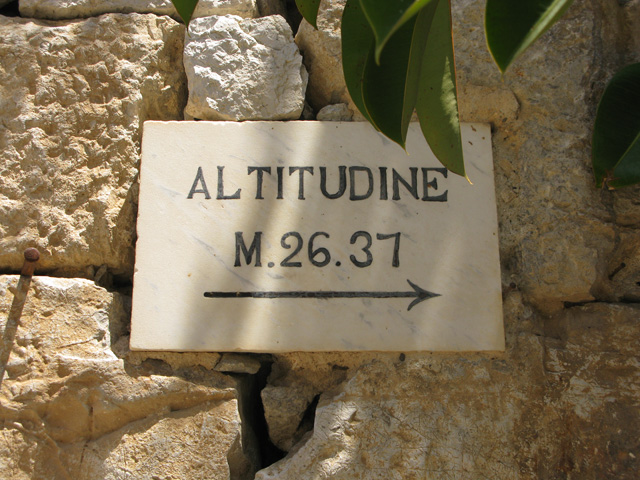
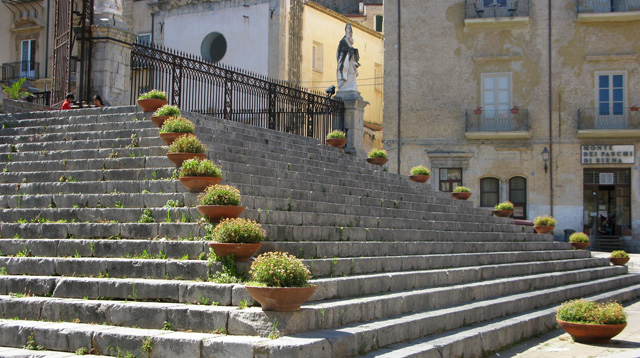
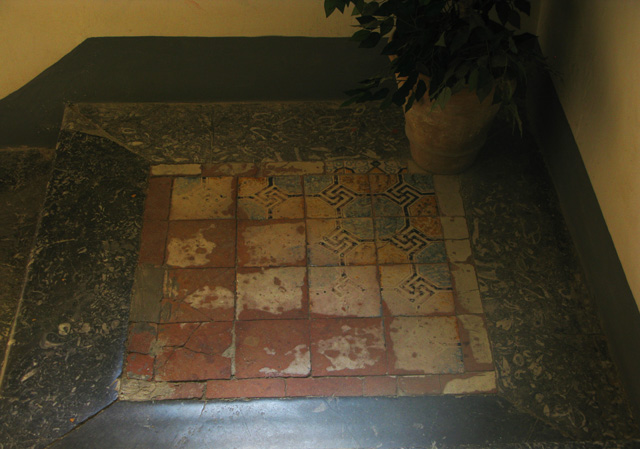

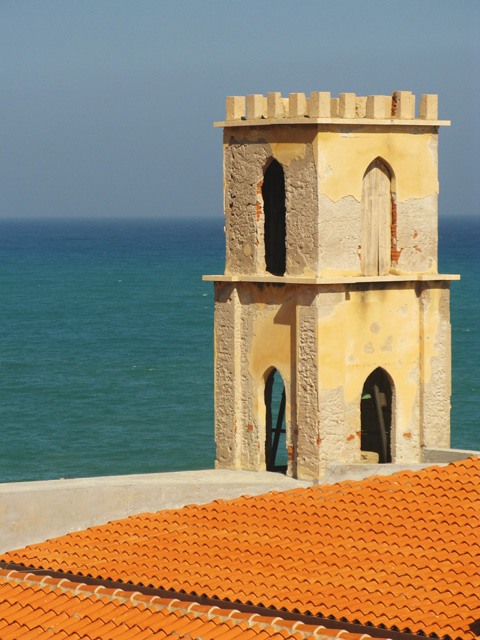
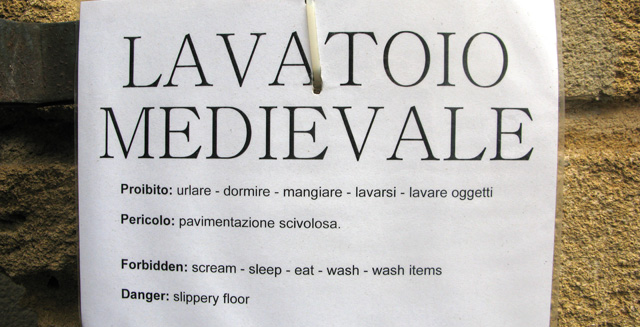
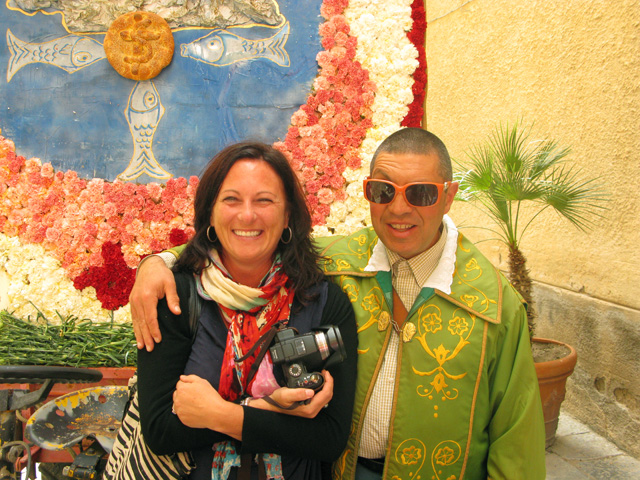
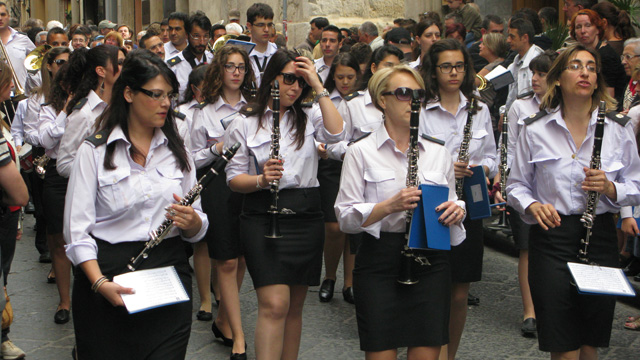
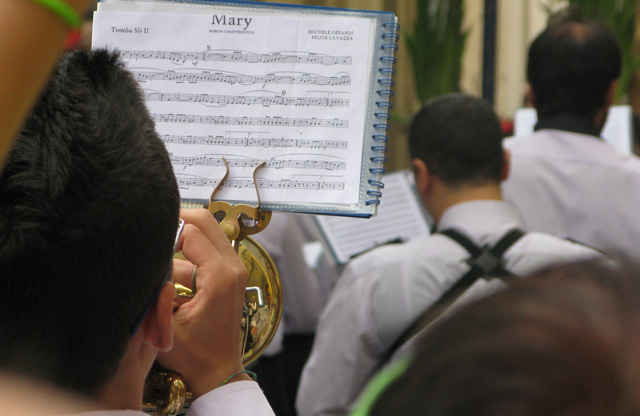
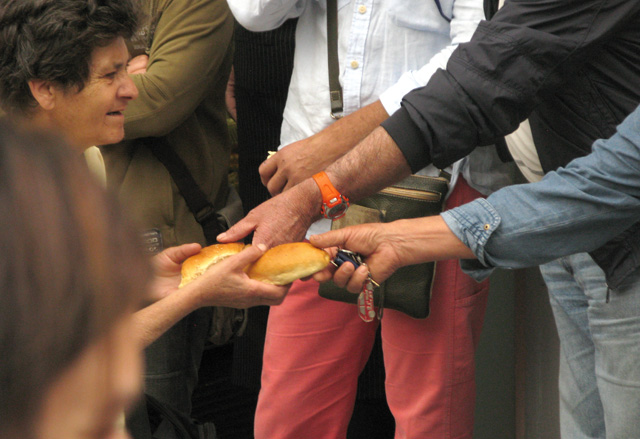






Pingback: Italy Roundtable: Talking the Talk | Brigolante Guest Apartments
Pingback: My memory grab bag » At Home in Tuscany
Pingback: Blogging - it's about the people | ArtTravArtTrav
Pingback: Writer's Block, Italian Style